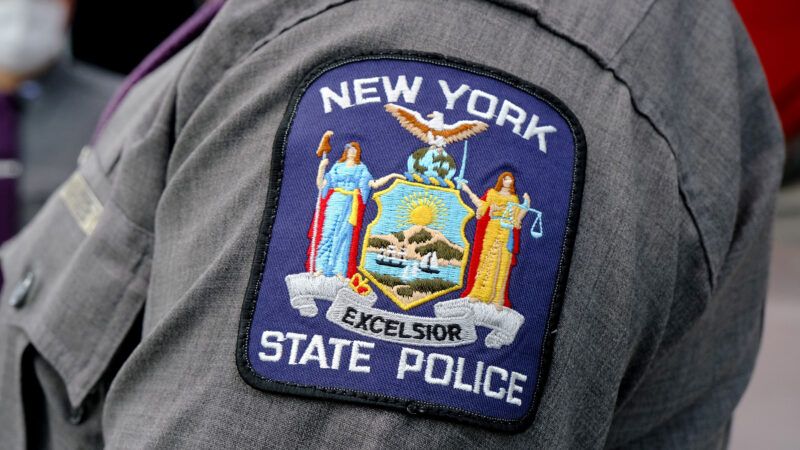Judge Rules New York State Police Must Disclose Misconduct Records
It's been nearly three years since New York repealed its police secrecy law, and departments are still fighting to hide misconduct records.

The New York State Police (NYSP) must turn over decades of disciplinary records and complaints against troopers, a New York state judge ruled today.
In response to a Freedom of Information lawsuit filed by the New York Civil Liberties Union (NYCLU), acting Supreme Court Justice Keri Savona ruled that the NYSP must begin disclosing misconduct records from 2000 through 2020. (Unlike most states, New York's Supreme Court is its trial-level court system.) The ruling is the latest defeat for police unions, which have been fighting to limit the scope of a 2020 law that made police disciplinary files public record.
"We are pleased that this decision orders the NYSP to begin disclosing thousands of its previously-secret disciplinary records—starting promptly in 30 days and continuing on a rolling basis as [New York's Freedom of Information Law] requires," Bobby Hodgson, a supervising attorney at the NYCLU, says in a statement to Reason. "The public has a right to complete information about the police misconduct investigations that take place in their communities."
In 2020, the New York Legislature repealed Section 50-a of the state's civil rights law, a statute that police departments relied on for four decades to keep disciplinary records and other police files secret. Police unions had waged successful court battles to expand the scope of the law to thwart reporters, civil liberties groups, and families of people killed by police from discovering nearly anything about officers' history. A 2018 report by the New York City Bar concluded that 50-a "has been interpreted so broadly that police misconduct in New York State is more secretive than any other state in the nation."
But as Reason reported last year, despite the repeal those records are still hidden in many jurisdictions due to ceaseless stonewalling from police departments. The NYCLU was litigating about a dozen different public records lawsuits against state and local law enforcement agencies for their misconduct records. It filed a suit against the New York State Police in July of last year after the department refused to turn over most of the records the NYCLU sought.
The NYSP argued that it would be unduly burdensome to locate the records. It did release a spreadsheet of complaints against troopers but redacted their names.
The NYSP gave the same treatment to local news outlets, but several found workarounds. When the NYSP refused to hand over disciplinary records to two reporters from The Buffalo News, the reporters instead asked a local district attorney's office, which dutifully complied with the law. The records showed that troopers were rarely fired, even for conduct like interfering with investigations, drunk driving, and intentionally crushing a man's eyeglasses.
Buffalo's ABC 7 News also obtained New York State Police misconduct records from a local district attorney. Those records revealed light punishments, such as a trooper who "took pictures in his State Police uniform with his genitalia exposed, losing five vacation days in 2008 and had sex on the job two years later, leading to an eight day suspension."
As The Buffalo News detailed in an editorial, police unions, rather than expressing chagrin, howled that the publication of such information was unfair. The New York State Police Investigators Association declared, "We do not and will not support sharing personal information with the public that is not relevant to any criminal proceeding." It also warned that publishing such records could "encourage more anti-police violence." The New York State Troopers Police Benevolent Association said it "condemns the recent so-called reporting by local media outlets gossiping about the disciplinary records of New York State Troopers."
The judge did not rule on whether the NYSP can continue to redact officers' names, but Hodgson says the NYCLU will continue to litigate that issue as well.
The Police Benevolent Association of the New York State Troopers, which intervened in the lawsuit on behalf of the NYSP, did not immediately respond to a request for comment.


Show Comments (10)